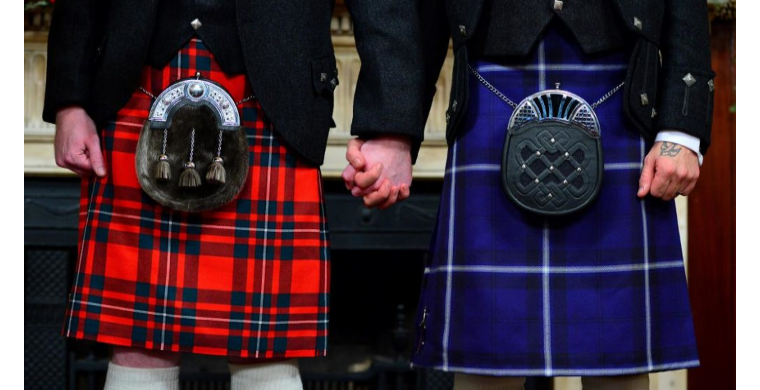Church of Scotland Moves Towards Redefinition of Marriage
By Jeffrey Walton
www.juicyecumenism.com
May 26, 2021
Scottish Presbyterians are closer to allowing ministers and deacons to marry same-sex couples.
Church of Scotland Commissioners approved draft legislation, known as an Overture, at the General Assembly on May 24 allowing clergy licensure to celebrate same sex marriage ceremonies. The vote was 319 to 217.
Legislation next goes to presbyteries for further consideration. Most presbyteries must back the legislation for it to become church law. Such a move would further compromise a church body already facing fierce cultural headwinds.
The Church of Scotland, the mother church of Presbyterians, mirrors many other state churches in western Europe, and more than a few of the U.S. mainline Protestant denominations, in its declining number of adherents.
According to Church of Scotland membership figures, the church in 2013 reported 398,389 members (7.5% of the total population) the first time it had dropped below 400,000. By 2018 (the most recent reporting year) membership dropped to 325,695, or 6%. According to the 2018 Annual Report of Scotland's People, 22% of the Scottish population (down from 34% in 2009) reported belonging to the Church of Scotland. In contrast, the same census reported that 841,053 Scots held membership in the Catholic Church in Scotland, or 15.9% of the population.
Increased secularization, demographic change (especially reduced birthrates) and urbanization likely all contribute to declines in the Church of Scotland, which correlates alongside theological innovations.
Officially, the Church of Scotland affirms a traditional understanding of marriage as between one man and one woman. At present church law only allows ministers and deacons to marry opposite-sex couples. But the General Assembly has been on a trajectory to develop legislation authorizing same-sex unions since May of 2018. Local churches already can call pastors in same-sex civil marriages, prompting church traditionalists to argue that orthodox teaching on marriage is essentially being chipped away.
The much smaller Scottish Episcopal Church has moved to embrace LGBT identities and sexual partnerships, even as it has precipitously declined to become one of the smallest provinces in the worldwide Anglican Communion. The 2011 Scottish census reported fewer than 10,000 people claiming affiliation with the Scottish Episcopal Church.
In 2017, Scottish Anglican clergyman The Rev. Kelvin Holdsworth, provost of St. Mary's Episcopal (Anglican) Cathedral in Glasgow, provocatively urged believers to pray for Prince George -- at the time age 4, and third in line to the throne -- to find the love "of a fine young gentleman" when he grows up so as to advance the cause of same-sex marriage in church. The same clergyman in January of the same year invited Muslims to give Quranic readings during a cathedral worship service -- readings that specifically denied the divinity of Jesus Christ.
The Free Church of Scotland, an evangelical Presbyterian body, strongly holds to a biblical teaching and counts an average attendance of 8,000 and 5,400 communicant members.
Worldwide, a small number of Presbyterian denominations including the Presbyterian Church (USA) permit clergy to solemnize same-sex marriages. The PCUSA General Assembly moved to redefined marriage as between any two persons in 2014, following the ordination of persons in non-celibate same-sex relationships in 2011. The latter caused the Mexican Presbyterian Church to conclude its 139-year-old relationship with the PCUSA, other overseas partners, including Presbyterians in Brazil and Peru, soon followed in concluding their partnerships with the PCUSA.
Like the Church of Scotland, the PCUSA has been in steep decline. Theologically orthodox Presbyterians looked to the exits as the "fidelity and chastity" clause was removed from PCUSA clergy ordination vows in 2010 and redefinition of marriage was approved by the General Assembly and ratified in 2015 by a majority of presbyteries. The denomination reported 2,016,091 members in 2010, and 1,572,660 in 2015, down to 1,245,354 in 2020, a loss of 770,737 active members across the decade (38%).
END














